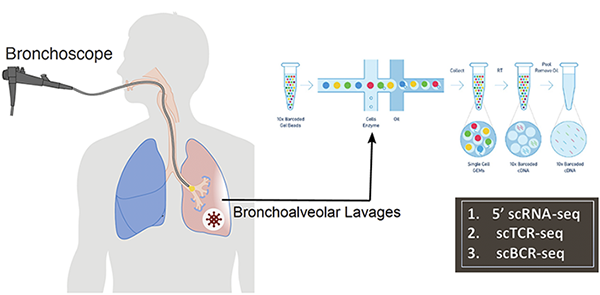immune atlas
Discriminating mild from critical COVID-19 by innate and adaptive immune single-cell profiling of bronchoalveolar lavages

- SARS-CoV-2 has rapidly swept across the globe affecting >33 million people, with >1 million fatal cases. It is now well appreciated that while most COVID-19 patients (80%) remain asymptomatic or experience only mild symptoms, 20% present with overt pneumonia; about a quarter of these progressing to life-threatening Acute Respiratory Distress Syndrome (ARDS) and severe or atypical systemic inflammation. Fever, increased acute phase reactants and coagulopathy with decreased lymphocyte counts, pronounced myeloid inflammation and increased neutrophil-to-lymphocyte ratio are predominant immunological hallmarks of critical COVID-19.
How the innate and adaptive host immune system miscommunicate to worsen COVID-19 immunopathology has not been fully elucidated. Here, we provide a comprehensive deep-immune atlas of COVID-19 pneumonia, analyzing BAL from 31 COVID-19 patients with mild or critical disease, while inclusion of 13 patients with non-COVID-19 pneumonia allowed us to reliably distinguish non-specific lung-localized inflammatory signaling from COVID-19 specific lung-associated immune changes. - Discriminating Mild from Critical COVID-19 by Innate and Adaptive Immune Single-cell Profiling of Bronchoalveolar Lavages , Wauters et al. - 2021 - Cell Research
- Our data were used in "Genome-wide CRISPR screening identifies TMEM106B as proviral host factor for SARS-CoV-2" (Baggen et al., Nature Genetics, 2021). To illustrate that the TMEM106B expression in epithelial cells from human airways correlates with SARS-CoV-2 infection.
Data availability
Raw sequencing reads of all single-cell experiments (scRNA-seq, scTCR-seq) have been deposited in the European Genome-phenome Archive (EGA) under study no. EGAS00001004717 and with data accession no. EGAD00001006893 (to access the data). Requests for accessing raw sequencing reads will have to be reviewed by the UZLeuven-VIB data access committee. Any data shared will only be released prior to a Data Transfer Agreement that will have to include the necessary conditions to guarantee protection of personal data (according to European GDPR law).
Alternatively, a download of the read count data (with corresponding meta-data) is more readily available from this website.
